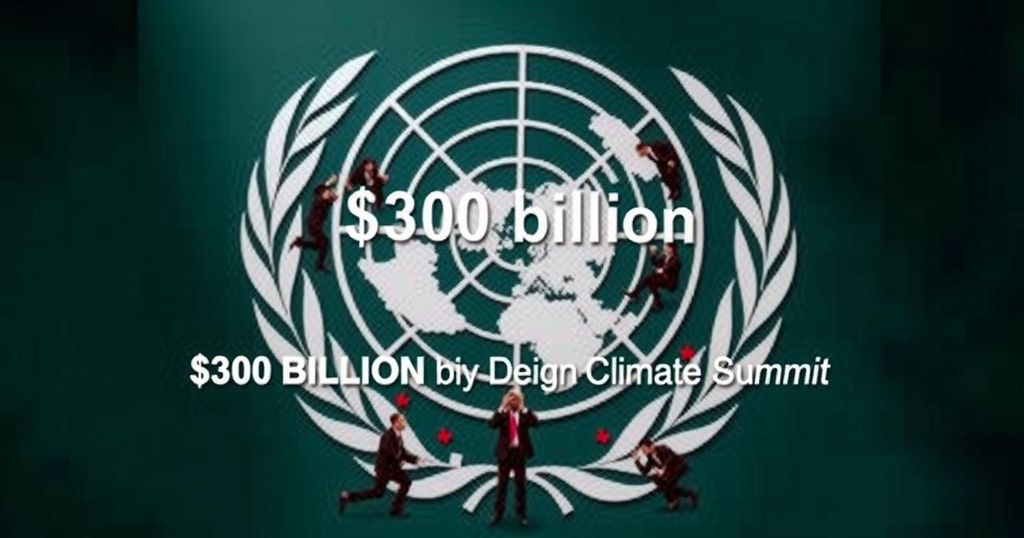Developing Nations Decry Insufficient $300 Billion Climate Deal at UN Summit

Developing nations have criticized the $300 billion annual climate finance commitment approved at the UN climate summit in Baku, Azerbaijan, calling it inadequate. The agreement, reached after intense negotiations, is seen as a minimal response to the pressing climate crisis, highlighting ongoing tensions between developed and developing nations regarding climate reparations and responsibilities. Key players expressed disappointment, emphasizing the need for more substantial pledges to support vulnerable countries facing escalating climate challenges.
At the recent UN climate summit held in Baku, Azerbaijan, a contentious agreement was reached, pledging at least $300 billion annually from developed nations by the year 2035 to aid developing countries in reducing greenhouse gas emissions and preparing for climate-related disasters. However, this commitment has been met with significant criticism, as many developing nations deemed the figure inadequate in light of the emerging climate crisis. India’s delegate, Chandni Raina, voiced that this pledged amount is “a paltry sum” and little more than an “optical illusion” that fails to address the magnitude of the challenges faced by vulnerable nations. Furthermore, Sierra Leone’s climate minister, Jiwoh Abdulai, expressed that this outcome reflects a pervasive “lack of goodwill” from wealthier nations, including the United States, Japan, and members of the European Union.
Despite the overall approval of the deal, the dissatisfaction was palpable among representatives of developing nations, who had anticipated a pledge closer to $500 billion. Expectations were consistently moderated by developed countries, grappling with financial constraints. UN climate chief Simon Stiell acknowledged the circumstances, stating, “no country got everything they wanted,” signaling the compromises made during negotiations. With concerns that the agreement was insufficient, delegates from various influential blocs, including the Alliance of Small Island States and the African Group of Negotiators, voiced their disappointment, indicating that the commitment does not meet prevailing global challenges.
The lengthy two-week summit highlighted persistent divisions over climate reparations, emphasizing the disparity between countries responsible for historic climate emissions and those bearing the brunt of its impacts. As the negotiations reached a critical point, delegates faced a palpable dilemma; many expressed strong sentiments of betrayal towards their wealthier counterparts. UK Energy Secretary Ed Miliband characterized the agreement as a pivotal moment. Meanwhile, COP president Wopke Hoekstra from the EU framed the deal as the beginning of a new era for climate finance. However, as outlined by experts, the overall commitment should actually surpass $390 billion to adequately support developing nations, exclusive of China, which is now expected to contribute voluntarily. The broader target posited is $1.3 trillion annually, with the bulk anticipated from private funding sources, further complicating future initiatives towards climate justice.
The ongoing discussions surrounding climate finance are critical, especially in the context of the growing disparity between developed and developing nations in addressing climate change. Developing countries often exhibit vulnerability due to their geographical and economic status, facing the brunt of the adverse effects of climate change while historically contributing the least to emissions. The need for a substantial commitment from industrialized nations stems from a recognition of their historical responsibility for climate change. The UN climate summits serve as a platform for negotiating financial support that directly impacts vulnerable communities and ecosystems, emphasizing the global urgency to implement equitable solutions.
The recent climate deal, while seen as a step forward, has been heavily criticized by developing nations as fundamentally insufficient. The call for a more robust financial commitment reflects an ongoing struggle within the international community to address the urgent realities of climate change. The criticisms voiced by representatives of various developing nations underscore the fractures that remain in discussions about climate injustice and financial responsibility. Moving forward, the emphasis must be placed on not only meeting but exceeding the pledged financial targets to genuinely support vulnerable populations and facilitate meaningful climate action on a global scale.
Original Source: www.france24.com






